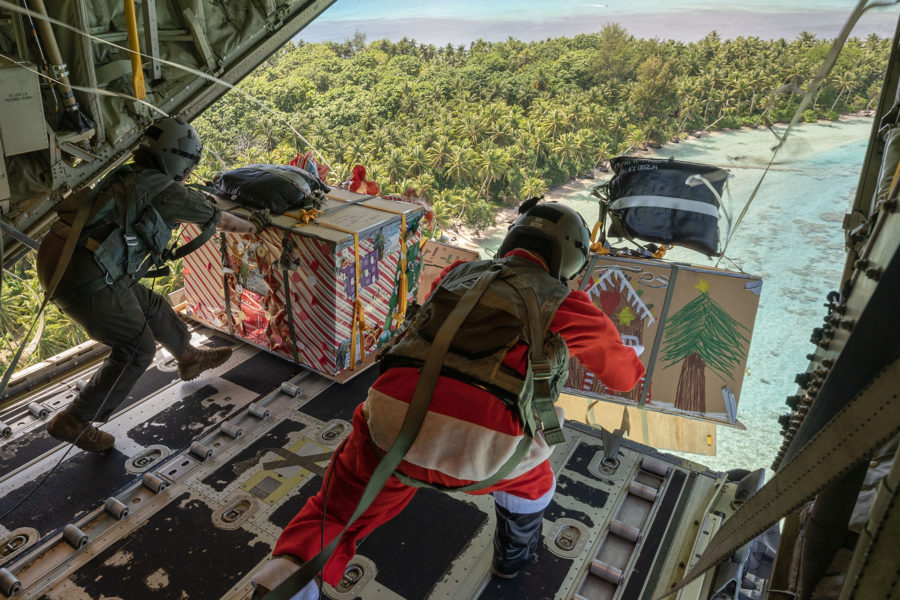The U.S. and partner nations delivered supplies from the sky in December, concluding the 71st iteration of Operation Christmas Drop on Dec. 13 after over a week of airdrops of more than 75,000 pounds of supplies to remote islands in the western Pacific.
The exercise delivers supplies such as food, fishing equipment, school books, medical gear, clothes, and other items to 57 remote locations in the Federated States of Micronesia and the Republic of Palau, according to the Air Force. It is the longest-running Department of Defense humanitarian mission. In 2022, 209 bundles were delivered to around 22,000 remote islanders, Pacific Air Forces said.
The effort was not just an American one. Drawing on their air forces’ commonality in operating the C-130, the U.S., New Zealand, Japan, South Korea, and Australia came together and participated in air drops operating from Anderson Air Force Base, Guam.
“Everybody can speak that same language, ‘Hey, we’re going to go out and deliver these goods, and it‘s going to be awesome,’” Capt. Andrew Zaldivar, Operation Christmas Drop mission commander, told Air & Space Forces Magazine. “And I think that is something that I know people understand.”
U.S. personnel included Airmen from the 374th Airlift Wing from Yokota Air Base, Japan; the 36th Wing, Andersen Air Force Base, Guam; and the 15th Wing from Joint Base Pearl Harbor-Hickam, Hawaii. Partner nations brought eight C-130s, according to PACAF.
Zaldivar explained that Operation Christmas Drop is a nearly year-long effort “starting pretty much the day after the drop.”
Starting in January, coordination begins with the mission commander and PACAF, which handles the invitations to partner countries. In its 71st year, the Air Force knows when and how certain aspects of the operation need to be done.
“It takes about a year for all information to get to where it needs to be,” Zaldivar, a pilot with the 36th Airlift Squadron, said in a phone interview from Japan.
The Air Force works with a private organization dedicated to the effort that collects supplies as part of the Denton Humanitarian Assistance Program. That program allows the U.S. military to transport and drop privately donated aid for free. The supplies are tailored to the needs of the island—Bruce Best, or Brother Bruce as he is known, connects with the remote islanders. Best is a researcher at the University of Guam who has been associated with Operation Christmas Drop for nearly 40 years.
Beginning in December, the Air Force and partner nations began practice drops. A few days later, the mission started.
“It is a very challenging task,” said Zaldivar, who also helped plan 2021’s operation. “But I told this to many people, and I am not lying when I say that this is the best thing I’ve ever done in the Air Force, the most rewarding thing I’ve ever done. When you drop those bundles, and then you see the children running to it and waving, it is just a feeling unlike any other thing I’ve ever had. It’s incredible.”
According to Zaldivar, the planes are loaded with two to 10 bundles of aid, and aircraft fly between two and four different islands per sortie, with islands ranging from 800 to 2,500 miles away from Anderson. A typical day included about two U.S. aircraft and two to three allied aircraft, which the nations rotate by day, he said, and trips took around four to nine hours round-trip. What are known as low-cost, low-altitude airdrops (LCLA) occur at around 300 feet.
“It takes the whole village to really make this happen,” Zaldivar said. “It really helps just bring everybody together. And also feel really good about it.”
The last flight of the 2022 operation was to Chuuk in the Federated States of Micronesia in a C-130J, callsign SANTA 67.
“One of our folks from a partner nation came back, and they were saying, ‘Hey, we dropped our bundle.’ Some of these islands have radios so that they can talk to us, they got all the children around the radio, and they screamed ‘Merry Christmas!’” Zaldivar recalled. “That was just like a feeling they’ve never experienced. I think the feedback has been overall very, very, very positive, and very rewarding.”
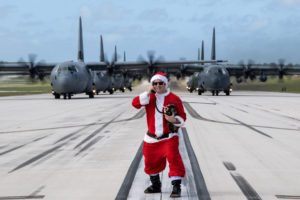
U.S. Air Force Lt. Col. Jeffrey Furnary, 36th Expeditionary Airlift Squadron director of operations, communicates by radio with C-130 pilots at Andersen Air Force Base, Guam, Dec. 10, 2022, during Operation Christmas Drop 2022. U.S. Air Force photo by Yasuo Osakabe
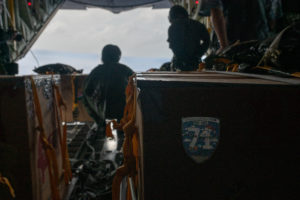
Japan Air Self-Defense Force Chief Master Sgt. Tatsuhiro Kurimoto and Staff Sgt. Ikkei Ono, C-130H Hercules loadmasters prepare to push packages out over the islands of Ruo and Murilo during Operation Christmas Drop, Dec. 6, 2022. Operation Christmas Drop is an annual U.S. Air Force tradition of packaging and delivering donated supplies such as food, fishing equipment, school books, and clothing to more than 20 thousand islanders across 56 remote islands throughout the Federated States of Micronesia and the Republic of
Palau.(U.S. Air Force photo by Airman 1st Class Allison Martin)
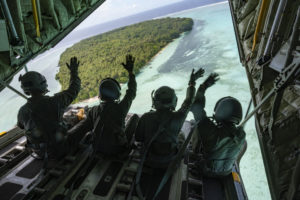
U.S. Air Force Col. Julie Gaulin (middle right), Vice Commander, 374th Airlift Wing, Col. Richard McElhaney (left), Commander, 36th Contingency Response Group, Japan Air Self-Defense Force Tech. Sgt. Tokita Akihito (middle left), 401st Tactical Airlift Squadron, and Staff Sgt. Ohno Ikkei (right), wave from the ramp of a JASDF C-130H Hercules, during Operation Christmas Drop 2022, Dec. 8, 2022.Operation Christmas Drop is the longest running Department of Defense humanitarian mission that delivers critical aid to island communities throughout the western Pacific while also providing an opportunity for aircrew to hone important skills needed for future operations. (U.S. Air Force photo by Staff Sgt. Jerreht Harris)
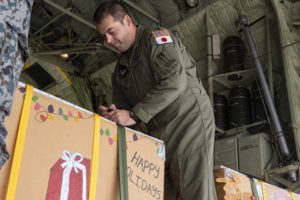
U.S. Air Force Lt. Col. Lucas Crouch, 401st Tactical Airlift Squadron, Komaki Air Base, Japan, writes a message on a supply bundle before takeoff from Andersen Air Force Base, Guam, during Operation Christmas Drop 2022, Dec. 8, 2022. Operation Christmas Drop is the longest running Department of Defense humanitarian mission that delivers critical aid to island communities throughout the western Pacific while also providing an opportunity for aircrew to hone important skills needed for future operations. (U.S. Air Force photo by Staff Sgt. Jerreht Harris)
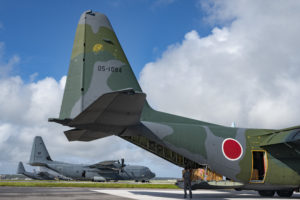
A Japan Air Self-Defense Force C-130H, from the 401st Tactical Airlift Squadron, Komaki Air Base, Japan, callsign Santa-52, sits on the flight line of Andersen Air Force Base, Guam, alongside U.S. Air Force C-130J’s before participating in Operation Christmas Drop 2022, Dec. 8, 2022. Operation Christmas Drop is the longest running Department of Defense humanitarian mission that delivers critical aid to island communities throughout the western Pacific while also providing an opportunity for aircrew to hone important skills needed for future operations. (U.S. Air Force photo by Staff Sgt. Jerreht Harris)
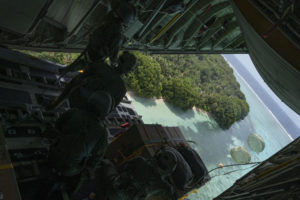
Japan Air Self-Defense Force and U.S. Air Force aircrew members deliver supply bundles to Ngatik Atoll in the western Pacific from the back of a JASDF C-130H Hercules, during Operation Christmas Drop 2022, Dec. 8, 2022. Operation Christmas Drop is the longest running Department of Defense humanitarian mission that delivers critical aid to island communities throughout the western Pacific while also providing an opportunity for aircrew to hone important skills needed for future operations. (U.S. Air Force photo by Staff Sgt. Jerreht Harris)
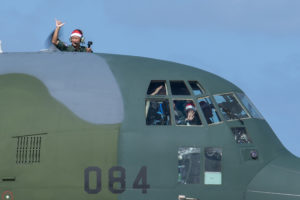
Japan Air Self-Defense Force aircrew with the 401st Tactical Airlift Squadron wave at members of the U.S. Air Force during a multinational elephant walk at Andersen Air Force Base, Guam, Dec. 10, 2022, as part of Operation Christmas Drop 2022. Seven C-130 aircraft from the U.S. Air Force, Royal Australian Air Force, Japan Air Self-Defense Force, Republic of Korea Air Force and Royal New Zealand Air Force participated in the elephant walk to mark the conclusion of Operation Christmas Drop, a humanitarian assistance effort meant to support remote island communities in the Federated States of Micronesia and Republic of Palau. (U.S. Air Force photo by Yasuo Osakabe)
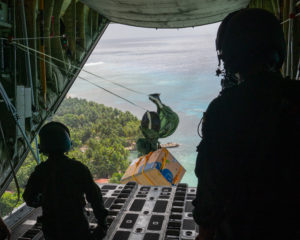
Japan Air Self-Defense Force Chief Master Sgt. Tatsuhiro Kurimoto and Staff Sgt. Ikkei Ono, C-130H Hercules loadmasters push a package out over the island of Murilo during Operation Christmas Drop, Dec. 6, 2022. Operation Christmas Drop is an annual U.S. Air Force tradition of packaging and delivering donated supplies such as food, fishing equipment, school books, and clothing to more than 20 thousand islanders across 56 remote islands throughout the Federated States of Micronesia and the Republic of Palau.(U.S. Air Force photo by Airman 1st Class Allison Martin)
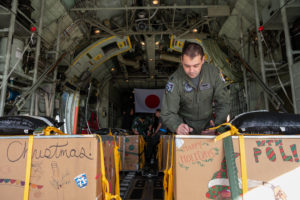
U.S. Air Force Lt. Col. Lucus Crouch, Japan Air Self-Defense Force exchange officer and C-130H instructor pilot, writes on a package before an Operation Christmas Drop flight at Andersen Air Force Base, Guam, Dec. 6, 2022. The weeklong international effort allows Pacific Air Forces Airmen from the 374th Airlift Wing from Yokota Air Base, Japan; the 36th Wing, Andersen AFB, Guam; and the 515th Air Mobility Operations Wing from Joint Base Pearl Harbor-Hickam, Hawaii, to work with partner nation Airmen to plan and execute low-cost, low-altitude air
drops, improving critical interoperability and communication for future
real-world humanitarian assistance and disaster relief missions.(U.S. Air Force photo by Airman 1st Class Allison Martin)
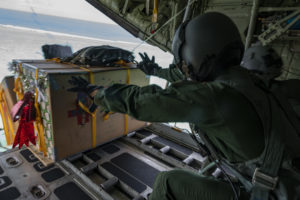
U.S. Air Force Col. Julie Gaulin (right), Vice Commander, 374th Airlift Wing, and Japan Air Self-Defense Force Tech. Sgt. Tokita Akihito (left), 401st Tactical Airlift Squadron, prepare to drop a supply bundle from the ramp of a C-130H, callsign Santa-52, as part of Operation Christmas Drop 2022, Dec. 8, 2022. Operation Christmas Drop is the longest running Department of Defense humanitarian mission that delivers critical aid to island communities throughout the western Pacific while also providing an opportunity for aircrew to hone important skills needed for future operations. (U.S. Air Force photo by Staff Sgt. Jerreht Harris)
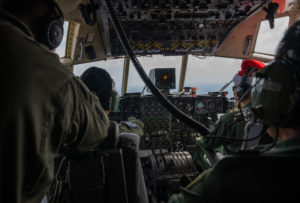
Japan Air Self-Defense Force Maj. Haruki Morota, a C-130H Hercules pilot and 2nd Lt. Senichiro Kawakami, C-130H Hercules co-pilot assigned to the 401st Tactical Airlift Squadron, Komaki Air Base, Japan, fly over the Pacific Ocean during Operation Christmas Drop, Dec. 6, 2022. Operation Christmas Drop is an annual U.S. Air Force tradition of packaging and delivering donated supplies such as food, fishing equipment, school books, and clothing to more than 20 thousand islanders across 56 remote islands throughout the Federated States of Micronesia and the Republic of Palau.(U.S. Air Force photo by Airman 1st Class Allison Martin)
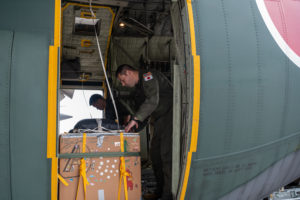
U.S. Air Force Lt. Col. Lucus Crouch, Japan Air Self-Defense Force exchange officer and C-130H instructor pilot, writes on a package before an Operation Christmas Drop flight at Andersen Air Force Base, Guam, Dec. 6, 2022. The weeklong international effort allows Pacific Air Forces Airmen from the 374th Airlift Wing from Yokota Air Base, Japan, the 36th Wing, Andersen AFB, Guam, and the 515th Air Mobility Operations Wing from Joint Base Pearl Harbor-Hickam, Hawaii, to work with partner nation Airmen to plan and execute low-cost, low-altitude air
drops, improving critical interoperability and communication for future
real-world humanitarian assistance and disaster relief missions. (U.S. Air Force photo by Airman 1st Class Allison Martin)
